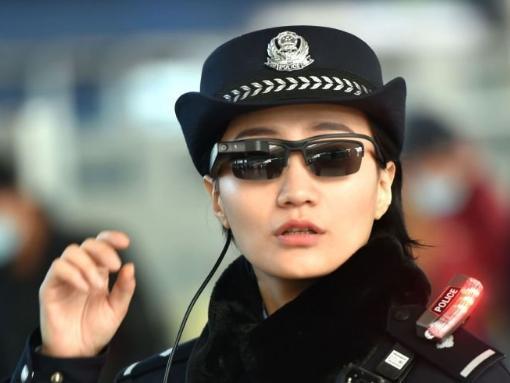Chinese police are using facial-recognition glasses to scan travelers
The new accessories were unveiled ahead of the Chinese New Year rush and have already been used to arrest people

Your support helps us to tell the story
From reproductive rights to climate change to Big Tech, The Independent is on the ground when the story is developing. Whether it's investigating the financials of Elon Musk's pro-Trump PAC or producing our latest documentary, 'The A Word', which shines a light on the American women fighting for reproductive rights, we know how important it is to parse out the facts from the messaging.
At such a critical moment in US history, we need reporters on the ground. Your donation allows us to keep sending journalists to speak to both sides of the story.
The Independent is trusted by Americans across the entire political spectrum. And unlike many other quality news outlets, we choose not to lock Americans out of our reporting and analysis with paywalls. We believe quality journalism should be available to everyone, paid for by those who can afford it.
Your support makes all the difference.Chinese railway police are using facial-recognition sunglasses to catch suspects at train stations in Zhengzhou, the capital of central Henan province.
The eyewear, which looks similar to the original Google Glass, was unveiled earlier this year and has already helped identify seven alleged criminals, according to the Communist Party's official newspaper People's Daily.
The glasses are linked to a database that can match travellers with criminal suspects. It is unclear how long it takes for a match to be made in the real world, butWu Fei, the CEO of LLVision Technology which developed the glasses, told The Wall Street Journal that, during testing, the system could identify faces from a database of 10,000 in 100 milliseconds.
So far the glasses have identified people suspected of misdeeds ranging from traffic infringements to crimes like human trafficking.
A further 26 people using fake identity documents were also prevented from travelling.
In China, people must use identity documents for train travel. This rule works to prevent people with excessive debt from using high-speed trains, and limit the movement of religious minorities who have had identity documents confiscatedandcan wait years to get a valid passport.
While this is the first time Chinese officials have used glasses to implement facial-recognition, the technology is widely used by police. China is also currently building a system that will recognise any of its 1.3 billion citizens in three seconds.
These programmes have been condemned by human-rights groups that say this implementation of the technology infringes on people's right to privacy.
“Chinese authorities seem to think they can achieve ‘social stability’ by placing people under a microscope, but these abusive programmes are more likely to deepen hostility towards the government,” Sophie Richardson, China director of Human Rights Watch, previously said about different facial recognition technology being used to monitor religious minorities. “Beijing should immediately stop these programmes, and destroy all data gathered without full, informed consent.”
The glasses are likely here to stay, having arrived just weeks before Chinese New Year when it is expected that 389 million train trips will be taken between Feb 1 and March 12.
• The 50 best TV show seasons of all time, according to critics
• What you should study at university if you want to be a billionaire
• These photos reveal what it's like to shop at Walmart in China
Read the original article on Business Insider UK. © 2018. Follow Business Insider UK on Twitter.
Join our commenting forum
Join thought-provoking conversations, follow other Independent readers and see their replies
0Comments